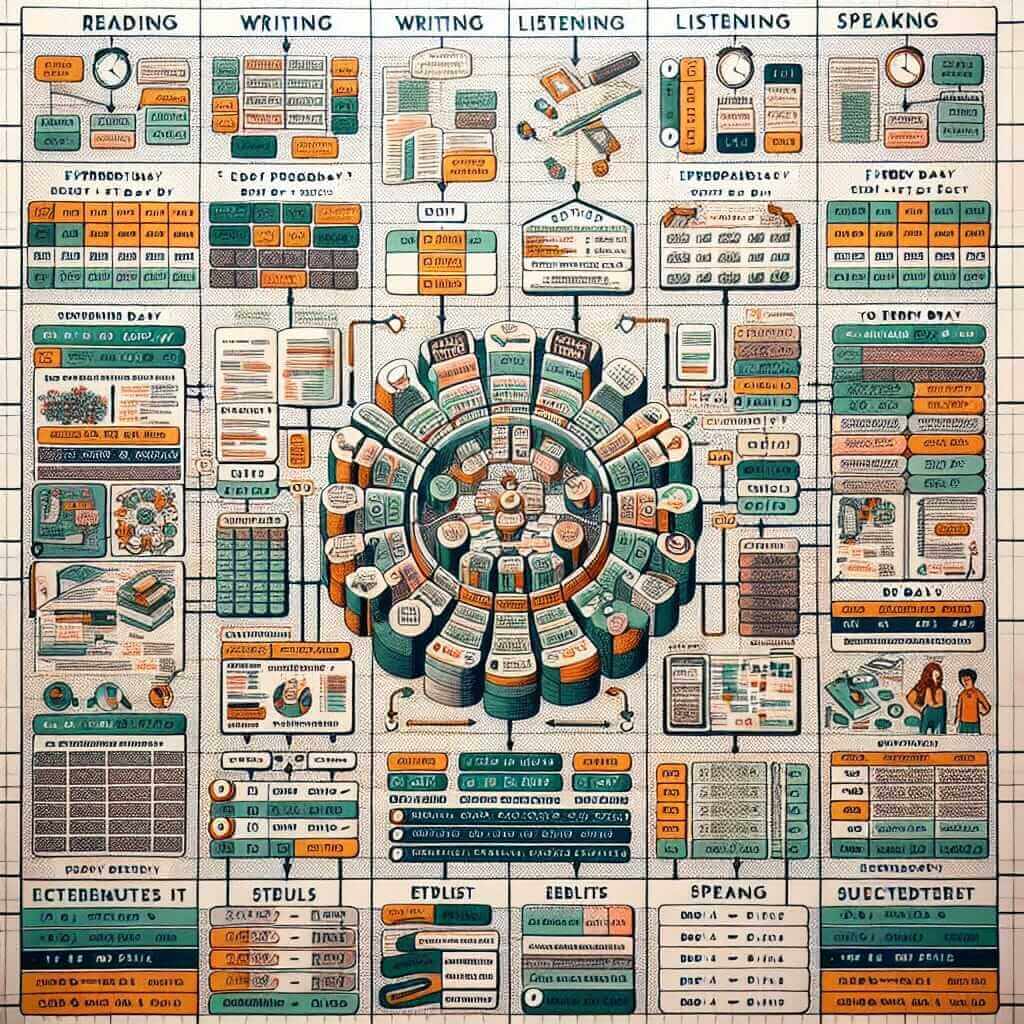Preparing for the IELTS exam in six days might sound daunting, but with a focused approach, it is entirely possible to achieve a satisfying result. This guide will provide structured steps, detailed explanations, practical examples, and effective strategies to maximize your preparation, focusing particularly on productive and receptive skills crucial for the IELTS exam.
Nội dung bài viết
- Understanding the Challenge
- Day-by-Day Study Plan
- Day 1: Familiarize with the Test Format
- Listening and Reading
- Example:
- Day 2: Work on Writing Skills
- Task 1 (Academic) and Task 2
- Day 3: Enhance Speaking Skills
- Day 4: Mock Tests
- Day 5: Focus on Weak Areas
- Day 6: Final Review and Relaxation
- Common Mistakes to Avoid
- Practice Exercises and Methods
- Conclusion
Understanding the Challenge
Before diving into the preparation, it is essential to comprehend what the IELTS exam comprises. The IELTS exam assesses your English proficiency through listening, reading, writing, and speaking. Each section needs a specific preparation strategy.
Day-by-Day Study Plan
Day 1: Familiarize with the Test Format
Listening and Reading
The IELTS Listening and Reading sections test your ability to understand spoken and written English in academic and everyday contexts.
Listening Tips:
- Practice with Real-life Examples: Use practice tests available on reliable IELTS websites. For instance, try Section 1, a conversation between two people set in an everyday context and consider timing yourself.
- Identify Common Traps: Be aware of distractors such as unnecessary information.
Reading Tips:
- Skimming and Scanning Techniques: Skim through paragraphs to get the gist and scan for specific information, such as names, dates, and keywords.
- Example Practice: Use past papers and practice tests which contain articles from academic sources.
Example:
- Listening: “Why is a student visiting the welfare office?” Possible answers include: To apply for a grant, to make a complaint, to ask for advice.
- Reading: Identify the correct information in a text about renewable energy sources.
Day 2: Work on Writing Skills
Task 1 (Academic) and Task 2
Task 1:
- Describe Visual Information: Practice writing about charts, graphs, and diagrams, focusing on trends and comparisons.
- Example: Describe a line graph showing the change in CO2 emissions between 2000 and 2020.
Task 2:
- Essay Writing Techniques: Familiarize yourself with different types of essays (opinion, discussion, problem-solution) and practice structuring your essays clearly.
- Example: Write about the advantages and disadvantages of remote work.
Day 3: Enhance Speaking Skills
Practice Common Topics:
- Part 1: Introduction and Interview (e.g., hobbies, work/studies).
- Part 2: Long Turn (talk about a memorable journey).
- Part 3: Discussion (work and career).
Fluency and Pronunciation:
- Record Yourself: Listen to your speeches and identify areas for improvement.
Example:
- Part 3 Discussion: Discuss the impact of technology on communication.
Day 4: Mock Tests
Conduct a full-length mock test to simulate exam conditions. This helps you manage time effectively and identify weak areas.
Evaluation:
- Listening and Reading: Check answers and analyze errors.
- Writing and Speaking: Ask for feedback from a teacher or an experienced friend.
Day 5: Focus on Weak Areas
Spend this day concentrating on the areas where you need the most improvement. Use targeted exercises and seek additional resources if necessary.
Example:
- Grammar and Vocabulary: Practice exercises on complex sentence structures and topic-specific vocabulary.
Day 6: Final Review and Relaxation
On the final day, review your notes and practice lightly. Avoid intensive study and ensure you get enough rest.
Example:
- Light Revision: Go through vocabulary lists and practice speaking for 15 minutes on various topics.

Common Mistakes to Avoid
- Overloading Material: Cramming too much information can be counterproductive.
- Neglecting Any Section: Give equal importance to all sections.
- Ignoring Instructions: Listen and read all test instructions carefully during the exam.
Practice Exercises and Methods
- Daily Practice: Allocate specific times each day for each section.
- Sample Tests: Use official IELTS practice tests to familiarize with the format.
- Peer Reviews: Participate in study groups for feedback.
Conclusion
Preparation for the IELTS exam in six days is demanding but feasible with a strategic and disciplined approach. Remember to leverage all the reliable resources available. For comprehensive preparation strategies, consider exploring this detailed guide on how to prepare for the IELTS in 16 days. With steadfast dedication and systematic practice, success in the IELTS exam is within your reach.
Good luck! If you have any questions or need further guidance, feel free to leave a comment below or explore other learning resources on our website.